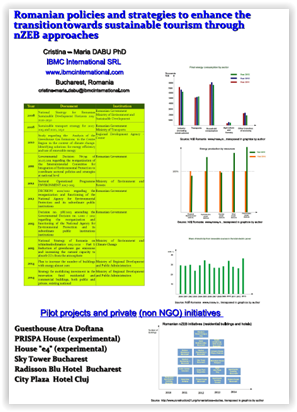Romanian policies and strategies to enhance the transition towards sustainable tourism through nZEB approaches.
The purpose of the work is to present the conclusions of a study developed by IBMC International SRL regarding the implementation of EU Directives in Romania through policies and strategies in order to enhance the transition towards sustainable tourism through nZEB approaches.
Approach:
The study consist of five parts:
1. EU legislation and policies
2. Romanian legislation and policies elaborated in order to implement in Romania the EU directives and policies
3. Romanian non-governmental organizations implied in sustainable development (projects, policies, results)
4. Pilot projects and private (non ngo) initiatives
5. Conclusions
Originality, innovation and relevance:
The originality, innovation and relevance of the study consist in the follow aspects:
The study provide an extending overview regarding the ways in which Romania implements the European Union policies and strategies on sustainable development and buildings nZEB type, neZEH, both in the administrative structures and civil society.
The study presents the actual state of art in the fields of nZEB and neZEH buildings in Romania.
Results / Lessons learnt/Replicability:
As Results / Lessons learnt, the study presents some cases of nZEB respectively neZEH building achieved in Romania, models that can be the starting points for other initiatives.
Conclusions :
1. At legislative level
There are normative acts through which EU directives and policies regarding the sustainable development and specific technologies nZEB, neZEH are transposed into Romanian legislation.
There are developed strategies for achieving the objectives established at EU level
2. At the level of civil society -
There is interest regarding the sustainable development and nZEB specific technologies and the possibility to implement them in order to enhance the transition towards sustainable tourism through nZEB approaches.
Actions are undertaken to inform and educate the civil society in order to achieve the objective of 20% reduction in CO2 emissions by 2020 using specific neZEH and nZEB technologies.
There are already completed a number of pilot demonstrative projects and private initiative for the construction of new NeZEH pensions / hotels or to upgrade the existing ones at neZEH level by improving them through adoption of specific nZEB technologies.










